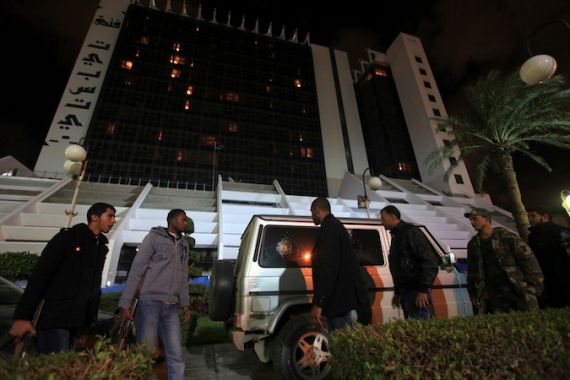Libya to up diplomatic security after attacks
Security source says Libya is considering a new security force for diplomats after attack on Italian consul in Benghazi.

Libya plans to create a special force to protect diplomats, government sources said, after a gun attack on an Italian consul highlighted the precarious security situation in the country.
Unidentified gunmen in Benghazi opened fire on Guido De Sanctis’s armoured car on Saturday. The diplomat was unhurt, but the attack was a reminder of the September 11 attack on the US mission there that killed the ambassador and three other Americans.
“We are discussing putting in place a force that would look after diplomats. There are also plans to protect foreigners working for foreign companies,” a defence ministry source said, declining to be named as the proposal was still being discussed.
“The idea is it would be mixed between police and army but would likely come under the command of the defence ministry.” The source said the members were likely to be trained abroad, but did not give an estimate of how many there would be.
Italian foreign minister Giulio Terzi said Saturday’s attack was “an attempt to destabilise the institutions of the new Libya.”
“Italy expresses its strongest condemnation and reaffirms its total support of the democratic path and the reforms that the Tripoli authorities have started,” he said in a statement.
‘This is not Switzerland’
An Italian foreign ministry spokesman said security around officials in Benghazi was already high before Saturday’s attack, which will strengthen views that the city is seen as too dangerous a place for foreign diplomats and workers. There was no immediate indication who might have been behind the attack.
More than a year after the overthrow of Muammar Gaddafi, security in Libya remains in disarray.
To keep a degree of order, the government relies on numerous militias made up of thousands of Libyans who took up arms against Gaddafi. The groups provide what passes for official security but also what poses the main threat to it.
The government has taken a twin-track approach, saying it will shut down rogue groups but licensing many of the most powerful armed brigades.
Almost 6,000 former rebel fighters have begun training to be policemen under a drive to disarm militias, the new interior minister said in an interview last week.
Confirming the government plan for a diplomatic security unit, a foreign ministry source said diplomats currently had to advise Libyan authorities if they planned to travel more than 80km from their base.
“Even when the force is established, diplomats need to take care of themselves. This is not Switzerland,” the source said.
The eastern city of Benghazi was where the anti-Gaddafi uprising broke out nearly two years ago but it is now a hot spot for violence, riven with armed factions.
In November, the city’s police chief was shot dead. And last June, a convoy carrying the British ambassador was attacked with a rocket-propelled grenade that injured two of his bodyguards.
The offices of the Red Cross in the city were also attacked last year, as was a convoy carrying the United Nations’ former special envoy to Libya.